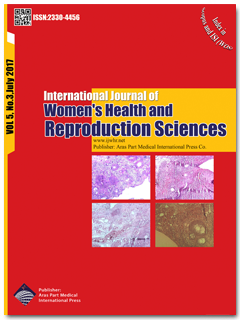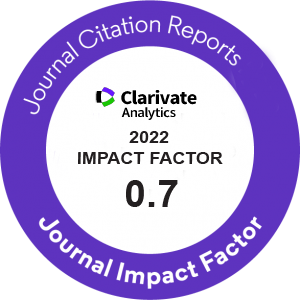| Original Article | |
| Socio-Demographic Predictors of Midwives? Knowledge and Practice Regarding Preconception Care | |
| Niloofar Sattarzadeh1, Azizeh Farshbaf-Khalili2, Elaheh Khari3 | |
| 1Department of Midwifery, Tabriz University of Medical Sciences, Tabriz, Iran 2Physical Medicine and Rehabilitation Research Center, Department of Midwifery, Tabriz University of Medical Sciences, Tabriz, Iran 3Students? Research Committee, Faculty of Nursing and Midwifery Faculty, Tabriz University of Medical Sciences, Tabriz, Iran |
|
|
IJWHR 2017; 5: 212?217 DOI: 10.15296/ijwhr.2017.38 Viewed : 3696 times Downloaded : 3454 times. Keywords : Iran, Knowledge, Midwifery, Preconception care |
|
| Full Text(PDF) | Related Articles | |
| Abstract | |
Objectives: Preconception care focuses on spouses? welfare and gestational health as well as related consequences before and after conception. The present paper was conducted in Tabriz health care centers, Iran in 2015-2016 in order to determine socio-demographic predictors of midwives? practice and knowledge regarding preconception care. Materials and Methods: This was a cross-sectional study implemented on all midwives (202) occupied in Tabriz health care centers, Iran, using socio-demographic, knowledge and practice questionnaires. The instrument validity was determined based on content validity index (CVI) and CVR methods while its reliability was determined from 2 aspects of repeatability (ICC) and internal consistency (Cronbach alpha coefficient). The socio-demographic and knowledge data questionnaires were completed by midwives while observational checklist of practice was completed by researcher. The data were statistically analyzed using descriptive and inferential methods. Results: Mean (SD) score of midwives? knowledge was 73.21 (± 11.83) and mean (SD) score of midwives? practice was 80.31 (±12.25). According to Pearson test, the direct relation between knowledge and practice was not significant (P = 0.133, r= 0.238). According to multivariate linear regression analysis, age, educational level, employment status and work experience were defined as predictors of midwives? knowledge and age, employment status and job responsibilities as predictors of midwives? practice. Conclusion: With regard to the direct correlation between knowledge and practice, improvement of midwives? knowledge and so paying attention to the predictors of practice such as employment status and job responsibilities in order to promote midwife?s motivation and practice seems to be essential to improve the quality of preconception care. |
Cite By, Google Scholar
Online Submission System
 IJWHR ENDNOTE ® Style
IJWHR ENDNOTE ® Style
 Tutorials
Tutorials
 Publication Charge
Women's Reproductive Health Research Center
About Journal
Publication Charge
Women's Reproductive Health Research Center
About Journal
Aras Part Medical International Press Editor-in-Chief
Arash Khaki
Mertihan Kurdoglu Deputy Editor
Zafer Akan






















